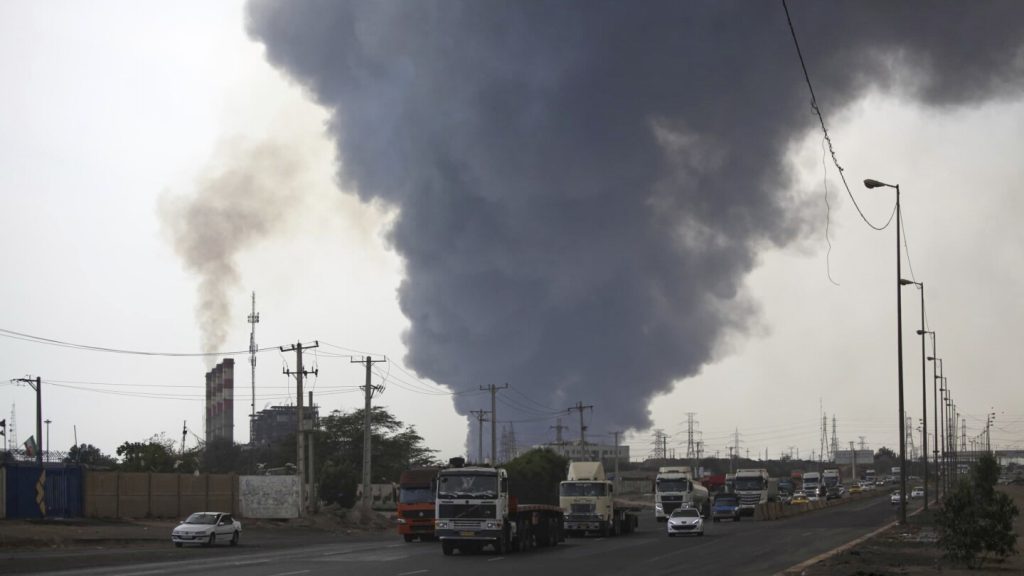DUBAI, United Arab Emirates (AP) — An explosion at an Iranian port resulted in at least 70 fatalities and over 1,000 injuries. The explosion originated from a facility owned by a charitable foundation associated with Supreme Leader Ayatollah Ali Khamenei’s office.
This foundation, known as Bonyad Mostazafan, is under U.S. sanctions for allegedly assisting Khamenei in accumulating wealth for his office, rewarding loyal supporters, and targeting political adversaries. The organization’s senior officials maintain direct connections to Iran’s paramilitary Revolutionary Guard, which manages the country’s ballistic missile program and international operations against its foes.
While authorities have not yet disclosed the cause of Saturday’s blast at the Shahid Rajaei port near Bandar Abbas, the port has reportedly been a receiving point for chemical components required for solid missile fuel. Although officials have denied these claims, local reports increasingly indicate the presence of a dangerously explosive shipment at the site.
Bonyads: Economic Powerhouses in Iran
The term bonyad, meaning “foundation” in Farsi, refers to organizations with significant economic influence in Iran. These foundations trace their origins to entities established by Shah Mohammad Reza Pahlavi. Following the 1979 Islamic Revolution, Grand Ayatollah Ruhollah Khomeini founded bonyads to manage the assets seized from the shah and religious minorities.
Bonyad Mostazafan, or the “Foundation of the Oppressed,” is believed to be the largest foundation in terms of assets, with a 2008 U.S. Congressional Research Service report suggesting it accounted for 10% of Iran’s gross domestic product at that time. The U.S. Treasury estimated its worth to be in the billions of dollars, with interests spanning mining, transportation, energy, and shipping through its Sina Port and Marine Services Development Co.
Satellite imagery reviewed by The Associated Press indicates that the explosion occurred near the Sina terminal, heavily damaging the facility and nearby containers. Following the incident, Saeed Jafari, CEO of Sina, stated that misleading claims about the cargo, which he described as “very dangerous,” led to the explosion. Access to the site has been restricted since.
Links to the Revolutionary Guard
Bonyad Mostazafan has maintained ties to the Revolutionary Guard since its inception. Its current president, Hossein Dehghan, is a former Guard general and serves as a military adviser to Khamenei. The U.S. Treasury has noted that the foundation engages in financial dealings with various security agencies, including the police and Iran’s Defense Ministry.
The organization has been labeled a “money box” for the Revolutionary Guard, allegedly supplying financial resources for its leadership and facilitating terrorist activities. In 2020, the Trump administration sanctioned Bonyad Mostazafan, claiming it was used by Khamenei to benefit his allies financially. Despite its significant influence, the foundation operates outside government oversight and is exempt from taxes on its substantial earnings, as per a 1993 decree from the Supreme Leader.
U.S. Sanctions and Chemical Shipments
Recently, the U.S. Treasury announced new sanctions against China and Iran regarding the transport of sodium perchlorate and dioctyl sebacate to Iran. Sodium perchlorate is used to create ammonium perchlorate, an essential component for solid fuel missiles. Reports indicate that a vessel carrying sodium perchlorate was present near Shahid Rajaei in recent weeks, despite Iranian officials denying any missile fuel was imported through the port.
After the explosion, a health warning was issued, indicating that pollutants like ammonia and sulfur dioxide were likely present in the air. Surveillance footage captured a reddish cloud rising before the blast, reminiscent of explosive incidents involving chemical compounds in the past, prompting speculation about the nature of the cargo involved in the explosion.



